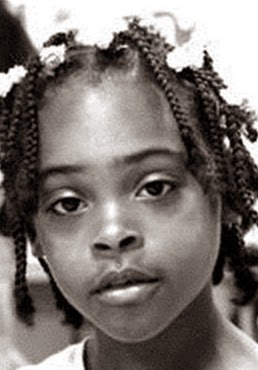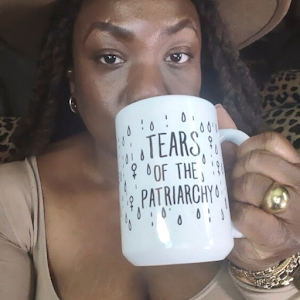When I first saw the black and white picture of missing 8-year-old little girl, Relisha Rudd… captured with a slight smile and a faraway look… it struck a chord with me. I stared at her picture for, what seemed like, an infinite number of minutes; maybe because I have a niece around Relisha’s age, who also enacts a similar look in pictures. Then when I read Relisha’s personal story and saw the surveillance video of her walking down the corridor of a D.C. hotel with 51-year-old janitor, Kahlil Tatum (her abductor), I felt a strong sense of disquietude because child abduction stories rarely ever turn out the way we’d like them to, and because I couldn't imagine my niece having to navigate the same precarious living situation as Relisha without having the luxury of dependable family members, or a concerned party, to help protect her from harm.
So many Black children go missing without the sense of urgency or alarm they're entitled to; and situations replete with extreme family dysfunction, Black single motherhood, and poverty, make it too easy to write the youngest and most susceptible victims of the system, off. Relisha Rudd’s story has been circulating in the national media (which is unlikely for little girls and boys that inhabit the same skin) and seems to get more disturbing as details surface.
What's been reported about Relisha, Kahlil Tatum, and where she’d been living so far is …
For the past 18 months she, her mother, stepfather and younger brothers had been staying in an overcrowded D.C. General shelter, cited for a number of violations per a 2012 audit, where security protocol was casually reinforced, and where residents felt discomfited by Kahlil Tatum’s presence and overfriendliness with the mothers and their children – he would offer them money and gifts, which violated the shelter’s safety measures.
Residents recounted to the Washington Post that rules were constantly violated, there was insufficient staffing, folks smoked marijuana outside the building, the security cameras were inactive, visitors were able to come and go without signing-in or showing identification, curfew was always broken, and that their concerns were often brushed off and staff would threaten to evict them from the shelter for complaining.
One 22-year-old mother recalled celebrating her 4-year-old daughter’s birthday in the shelter’s cafeteria and becoming ruffled after seeing Tatum trying to give her little girl $2.00, “It was weird, because you don’t know me from Adam and Eve. I said, ‘No, she can’t take that.’” It was also noted by several mothers, that Tatum seemed to try to endear himself to their young daughters, but never any of the sons.
What's also been established is…
Relisha Rudd, who was last seen at the shelter on March 1, had apparently been missing since late February and was only put on police radar after D.C. public school officials contacted them, upon noticing she’d racked up an alarming number of absences. A D.C.-wide Amber Alert went out March 20th but Maryland officials, reportedly, never got the request.
Kahlil Tatum, who’d been given unfettered access to Relisha by her mother, posed as the little girl’s doctor and signed a sick note sent to the school by Relisha’s mother. Tatum then, reportedly, accepted a call from the school when they followed up and told him he needed to fill out forms. Tatum told school officials to drop the forms off at the homeless shelter, but raised suspicions when he failed to meet them there.
Relisha’s mother refused to cooperate and sign papers reporting that her daughter was missing. Child and Family services became involved; taking custody of Relisha, so authorities could begin searching for her, and her brothers.
“I wasn't under the impression that she was missing..."
In a troubling interview with NBC Washington’s News4 reporter Shomari Stone, Shamika Young (who is now under investigation by a grand jury for obstruction of justice) was emphatic about not having been told to file a missing person’s report and not feeling any sense of responsibility for Relisha’s disappearance, and claimed her daughter was in the care of her grandmother and aunt (both deny it),
“I wasn't under the impression that she was missing. I was under the impression that she was still at my sister's house, where I left her and under the care of my mother."
Shamika also admitted that she didn't file a police report, because she didn't want to lose custody of her other children.
When asked why she so willingly trusted Kahlil Tatum around her daughter, Shamika Young insisted,
“He didn't look like that type of person. He looked like a good person... the way he played with everybody's kids, the way he did his job the way he needed to do his job buffing them floors... he didn't look like an [intimidating] person, he really didn't."
Shamika also challenged critics of her parenting,
"I’m a helluva good mother, and I am gonna say this: it’s kids out here that wish they had a mother like me. 'Cause some of these parents don't support their kids like they're supposed to. So, it's kids out here who wish they had a mother, that was doing the things that I was doing for my children, that would do for them.”
Police, reportedly, believe Shamika Young gave Relisha to Kahlil Tatum, who is also suspected of murdering his wife (who was found on March 20, shot to death in an Oxon Hill motel room) and begin searching in Washington’s Kenilworth Park & Aquatic Gardens, where Tatum was spotted shortly after having purchased gallon sized trash bags and lime from Home Depot; turning the search for Relisha into the possible recovery of her little body. Instead, police found Tatum’s body in the park 11 days after discovering his wife's, dead of an apparent suicide... but still no sign of Relisha.
As if the hunt for Relisha couldn't get any more disturbing and complicated, advocacy group The Black and Missing Foundation, believe that Relisha’s appearance may have been altered and that she may have been sold into a human trafficking network… a claim exacerbated by Facebook photos of Relisha’s stepfather and mother posturing with a wads of cash; cash that, according to Relisha’s mother and maternal grandmother, came as a result of cashed checks – one, a social security disability check; the other(s), a tax refund and/or insurance settlement from a car accident.
The Metropolitan Police Department is also seeking help identifying a Black man on a surveillance video seen stepping off of an escalator, and believes he may be able to provide some insight into Relisha’s disappearance.
I refuse to try to rationalize why so many adults failed to provide a safety net for the little girl who appeared to love to dance and play with her younger brothers, and who desperately wanted a reprieve from her living situation at "The G" (as she purportedly called the shelter), because there is no justification, as far as I'm concerned. Relisha didn't seem to stand a chance in an underworld teeming with predators that prey on overlooked children and young girls just like Relisha. I don't fully know the circumstances that led Shamika Young to the dire situation she's currently in (but suspect it may be a pattern she inherited from her own upbringing), but will say that I can’t fathom how a mother could fail to be doubly cautious with her young children, in such an unforgiving space and system that don't serve the interests of the struggling mothers and young children that inhabit it.
Relisha’s disappearance could have been prevented, particularly since complaints had been logged against Shamika Young (between 2007 and 2013) for abuse and neglect, and because many school officials, shelter staff, police, relatives, and social service counselors had some sense of awareness about her at-risk situation; and it hearkens back to the tragic case involving Banita Jacks’s children, also in D.C., as well as the horrific circumstances surrounding the death of 5-year-old Shaniya Davis in North Carolina.
Children who're at risk and living outside the margins shouldn't have to keep slipping through the cracks, before child protection and social services are prompted to do a thorough job of keeping them safe, especially when their parents and immediate relatives aren't fit to do so.
Relisha Rudd deserves to keep dancing and playing, and she deserves to experience the opportunity to be cared for and protected the way she deserves to be, so I’ll swallow the sense of dread I feel and hope that she is eventually found … alive.










No comments
Post a Comment